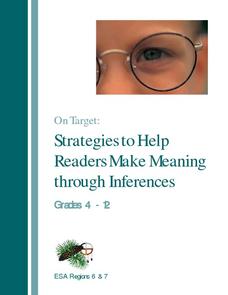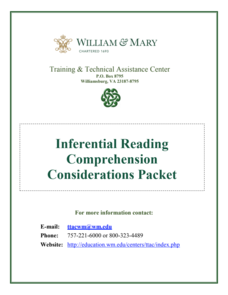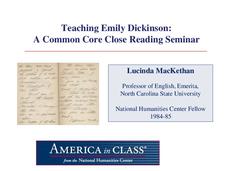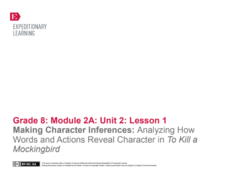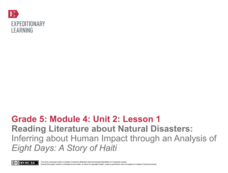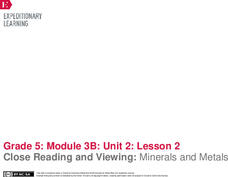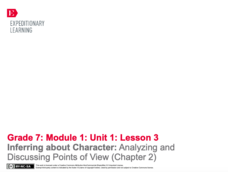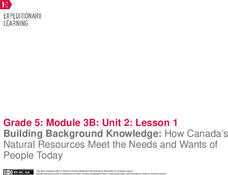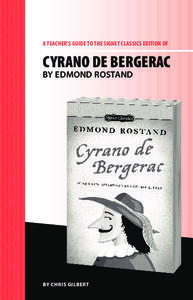Curated OER
Mini-Lesson Planning for Inferences
Making inferences and drawing conclusions is a key component to successful active reading. Encourage your class to use context clues and prior knowledge to infer different elements of a story, including the setting, plot, and character...
Curated OER
On Target: Strategies to Help Readers Make Meaning through Inferences
Here's a resource that explicitly teaches, models, and provides readers with opportunities to practice the process of drawing inferences from text. Packed with strategies elementary, middle, and high school teachers can use, the resource...
EngageNY
Inferring about Character: Getting to Know Percy (Chapters 1 and 2)
What a character! Scholars look at two chapters in The Lightning Thief to make inferences about the character Percy. They record both the character's challenges and responses. Learners then work in their triads to discuss the gist...
Academy of American Poets
Teach This Poem: "In the Next Galaxy" by Ruth Stone
Imagine what life might be like in a different galaxy. That's the challenge young scientists take on in a warm-up activity designed to prepare them for a close reading of Ruth Stone's poem "In the Next Galaxy." After class members share...
Curated OER
Using Random Sampling to Draw Inferences
Emerging statisticians develop the ability to make inferences from sample data while also working on proportional relationships in general. Here, young learners examine samples for bias, and then use random samples to make...
K20 LEARN
Considering "Charles": Pictograms, Annotations, Reading Strategies, And Multimodal Responses
Shirley Jackson's short story, "Charles," provides middle schoolers with an opportunity to practice their close reading skills. Using the provided list of prompts, scholars read and reread the story, then create a multimodal response to...
EngageNY
Establishing Structures for Reading: Gathering Evidence about Salva’s and Nya’s Points of View (Reread Chapters 1 and 2)
Readers practice gathering textual evidence to support their understanding of character point of view in A Long Walk to Water by Linda Sue Park. Working with partners, they complete a Gathering Evidence graphic organizer and engage in...
EngageNY
Mid-Unit Assessment: Evidence and Inference in Pygmalion
Scholars complete the Pygmalion mid-unit assessment to show their progress toward the unit's stated goals. The assessment requires learners to read text and successfully answer multiple choice and extended response questions.
William & Mary
Inferential Reading Comprehension Considerations Packet
Don't forget to read between the lines! Educators learn tips and activities to help scholars learn to infer to increase reading comprehension. Activities suggested include think alouds, backwards words, and who's who. the packet includes...
West Corporation
Making Inferences – Use Your Mind to Read!
How can you tell if someone is happy? The lesson works with elementary and middle school scholars to activate their schema and pay attention to details to make inferences in their daily lives, poetry, and other literature. Cleverly...
Ontario
Reading Graphic Text
Do students really need to be taught how to read cartoons, comic books, and comic strips? Yes. Just as they need to learn how to read other forms of graphic text such as diagrams, photos, timetables, maps, charts, and tables. Young...
National Humanities Center
Teaching Emily Dickinson: A Common Core Close Reading Seminar
Three of Emily Dickinson's poems, "I like to see it," "Because I could not stop for Death," and "We grow accustomed to the Dark," provide instructors with an opportunity to model for class members how to use close reading strategies to...
EngageNY
Making Character Inferences: Analyzing How Words and Actions Reveal Character in To Kill a Mockingbird
Partner up! After an I have/who has activity, readers partner with one of their discussion appointments to add evidence from chapters 11-13 in To Kill a Mockingbird to the Atticus Note-catcher. Partners then share with the class and add...
EngageNY
Reading Literature about Natural Disasters: Inferring about Human Impact through an Analysis of Eight Days: A Story of Haiti
This is a disaster. Scholars look through the book Eight Days: A Story of Haiti and discuss their wonderings about the text and natural disasters. They then complete a first read to determine gist and second read to answer...
Curated OER
Mini-Lesson: Planning for Inferences
The five lessons in this resource are designed to teach class members how to read between the lines, how to use personal experience/background knowledge/schema, along with the information in the text, to make assumptions about...
EngageNY
Close Reading and Viewing: Minerals and Metals
How easy is it to live off the land? Scholars read Minerals and Metals in Your Life and discuss how Canada's natural resources meet the needs of the people. Pupils watch a brief video and discuss the gist of the text and video. They...
Teaching Tolerance
Using Photographs to Teach Social Justice | Legal Action: The Supreme Court
A social justice lesson focuses on the Supreme Court case Loving v. Virginia which struck down laws that prohibited marriages between African Americans and white Americans. The lesson begins with class members examining a photograph of...
EngageNY
Inferring about Character: Analyzing and Discussing Points of View (Chapter 2)
Readers engage in discussion with partners to answer questions about A Long Walk to Water by Linda Sue Park. Next, they complete exit tickets, writing about how the author creates different points of view for her characters.
EngageNY
Learning About Farms in Colonial America: Explicit vs. Inferred Information
Aid your pupils in understanding the terms explicit and inferred while teaching them about colonial farmers. The third activity in the module builds off the previous activity and focuses heavily on inference. Learners analyze a...
Farmington Public Schools
British Literature Honors: Beowulf
Whether new to teaching Beowulf or an experience pro, you'll find much to like in a richly detailed unit plan that asks readers to consider how the epic represents the difficulty in defining good and evil but also reflects the changing...
EngageNY
Building Background Knowledge: How Canada’s Natural Resources Meet the Needs and Wants of People Today
Learners follow along as the teacher reads Products of Mining in Canada: From Batteries to Vehicles aloud. They then discuss the meaning of key terms and determine the gist of the text. Pupils do a second read and complete a graphic...
Penguin Books
A Teacher's Guide to the Signet Classics Edition of Cyrano de Bergerac by Edmond Rostand
Edmond Rostand's Cyrano de Bergerac has enjoyed popularity since its debut in 1897 due in large part to the themes it addresses. Instructors planning on using the play with their classes will find much to like in this teaching guide. The...
EngageNY
Analyzing Images and Language: Inferring about the Natural Disaster in Eight Days
Pictures often reveal different meanings. Scholars analyze the images in Eight Days and discuss how they add meaning to the text. Readers answers questions about how specific colors are used to create different emotions. Learners then...
Prestwick House
Teaching Shakespeare: Sonnet 73
It's that time of year to consider how Shakespeare selects his images and structures his Sonnet 73 to develop the meaning of the poem. Class members examine the rhyme scheme, the indented lines, the conceit, and the images used in each...

